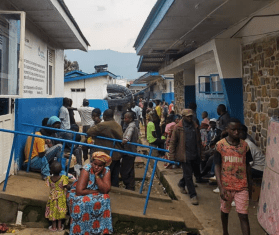As armed clashes in Goma, a city in eastern Democratic Republic of Congo (DRC) have spiked in recent days, Doctors Without Borders/Médecins Sans Frontières (MSF) teams continue to treat the influx of wounded patients at Kyeshero Hospital in the city.
While non-essential staff have been relocated out of Goma as of Wednesday morning, MSF is preparing to send new teams into the largest city in North Kivu.
The fighting—which includes clashes between the armed rebel group M23, the Congolese army, and their respective allies—has had a devastating impact on people in eastern DRC.
Since January 23, MSF has treated 142 wounded patients just in Goma. On Tuesday alone, MSF received 37 injured people, half of them civilians and most of them women. Most of the injuries were caused by shrapnel, while other patients suffered gunshot wounds.

The impact of fighting on civilians in Goma
Since Friday, the population has had to cope with continuous water and electricity cuts. The supply of meals MSF provides to patients and their families is also threatened due to ongoing insecurity, looting, and the closure of roads. Meanwhile, medical and humanitarian needs in and around Goma are growing. In recent weeks, tens of thousands have joined the 650,000 people already living in camps around Goma for more than two years. The fighting has also raged in this area, forcing some people living there to flee.
What to know about the escalation in DR Congo
Learn more"The impact of this fighting on the civilian population is enormous,” said Stephan Goetghebuer, MSF's head of programs in North Kivu. “In addition to the wounded and dead, we are receiving devastating reports from displacement camps where our teams can no longer go. In the Kanyaruchinya site, the health center we support continues to operate, but the team has seen two children die this week because they could not be transferred to any hospital."

Direct attacks on health and humanitarian aid
Humanitarian and medical facilities and their personnel have also experienced direct attacks.
“At Kyeshero Hospital, a bullet pierced the roof of the operating theater during an operation," said Virginie Napolitano, MSF's emergency coordinator in North Kivu, speaking from Goma. "Several of our stocks of equipment and medicines have been looted, jeopardizing our medical assistance inside and outside of Goma. Armed looting has also affected our colleagues. One of them was wounded by gunshot in his home. Other organizations and medical facilities have also come under fire. This is totally unacceptable."

MSF calls for increased humanitarian access
MSF is preparing to send teams back into Goma to assess the response capacity following the looting over the past few days, with a goal of replenishing stocks and scaling up emergency care as soon as possible. A potential crossing point is the Great Barrier separating the DRC from Rwanda, provided that the movement of equipment and humanitarian teams between the two countries is facilitated and guaranteed.
As the situation continues to deteriorate, MSF urges the warring parties to do more to protect civilians, to respect the most basic rules of international humanitarian law, and to guarantee humanitarian access to provide people with essential medical assistance.
Apart from Goma, MSF teams are still present in other conflict-affected areas of North and South Kivu.




